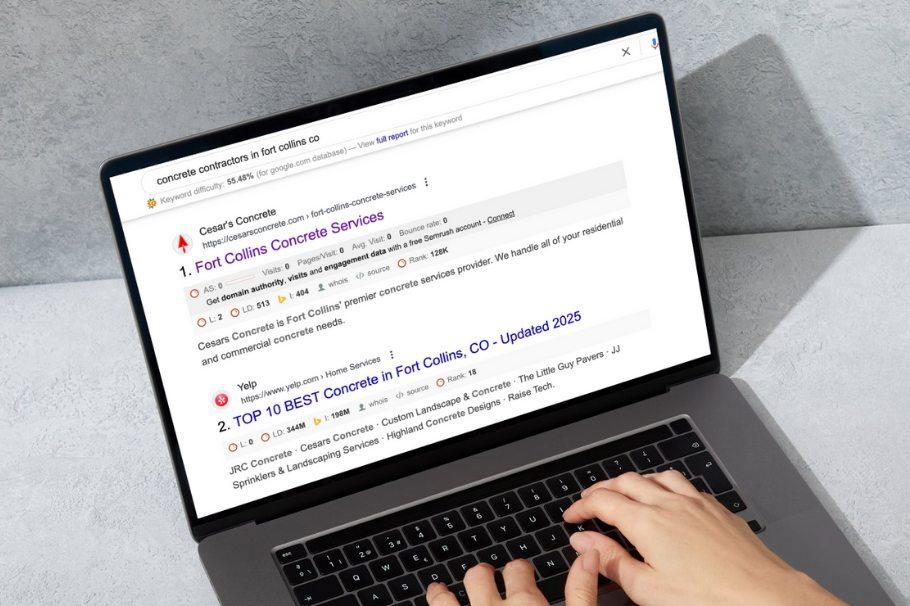Google Ads vs. Facebook Ads: Which Is Better for Contracting Companies?
When it comes to boosting your contracting business, selecting the right advertising methods is crucial. Let's explore Facebook Ads and Google Ads to help contracting companies make well-informed decisions regarding their marketing strategies.
Google Ads for Inbound Marketing
For contracting businesses, Google Ads can be a game-changer. Imagine someone urgently needing concrete repair work and searching "emergency concrete repair" on Google. With Google Ads, your contracting company can appear right at the top of search results, putting you in front of people actively seeking your services. These leads are often highly interested and ready to hire, making Google Ads invaluable for acquiring customers. While acquiring these leads might come at a higher cost, they tend to convert into paying customers more frequently, offering a better return on investment.
Facebook Ads for Outbound Marketing
With Facebook Ads, you can showcase your services to numerous potential customers on social media. You can choose who sees your ads based on things like their interests and location. This helps your contracting business reach more people and secure more jobs. Whether you're sharing photos of your recent projects, informing people about your plumbing or electrical work, or offering deals to homeowners nearby, Facebook Ads are an effective way to spread the word about your business and generate interest in hiring you.
Paid Search vs. Paid Social
You've probably encountered both types of ads while scrolling on Facebook or searching on Google. But how do they work?
Both are advertising platforms that operate on a pay-per-click (PPC) basis. When you create an ad on either platform, you enter an auction where you bid for ad space. Then, you'll be charged a certain amount every time someone clicks one of your contracting business's ads.
This article primarily addresses the differences between paid search and paid social to help you determine which option might be best suited for your contracting business.
Traditionally, Google Ads represent paid search. Paid search means that you're paying to have your contracting business's listing featured on a search engine result page (SERP).
Here's an example of a paid Google search ad:
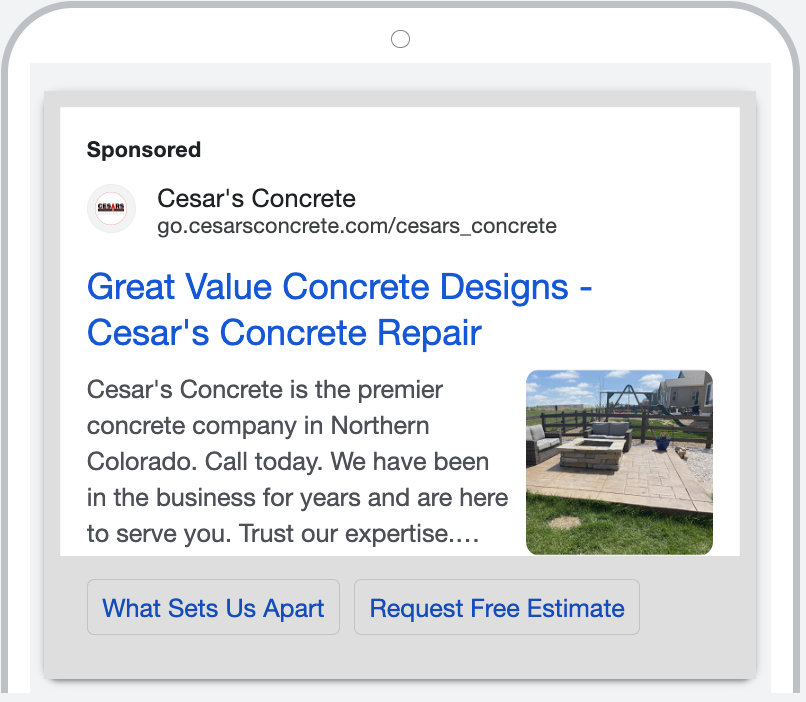
With paid search, your contracting business's ad is placed based on target keywords instead of targeting a specific audience interest. Nevertheless, you can (and should) adjust the settings of paid search campaigns to target users based on location and other factors.
However, Google Ads offers more than paid search—you can advertise on:
- Google Search
- YouTube Ads
- Google Display Network
- Google Performance Max
- Google Maps
In contrast to paid Google search, Facebook Ads offers paid social media advertising. With consistent changes in the Facebook algorithm, it has become increasingly challenging for contracting businesses to reach their potential customers organically.
This is where paid social media ads come into play. With Facebook Ads, you are paying to reach new customers on social networks instead of reaching them organically.
As you know, Facebook isn't limited to just your Facebook Feed. A few of the Facebook ad placements to advertise on include:
- Facebook Feed
- Instagram Feed
- Facebook Marketplace
- Facebook Video Feeds
- Facebook Right Column
- Audience Network
- Facebook Messenger
- Oculus mobile app Feed
Here is an example of a paid ad on Facebook's Feed:
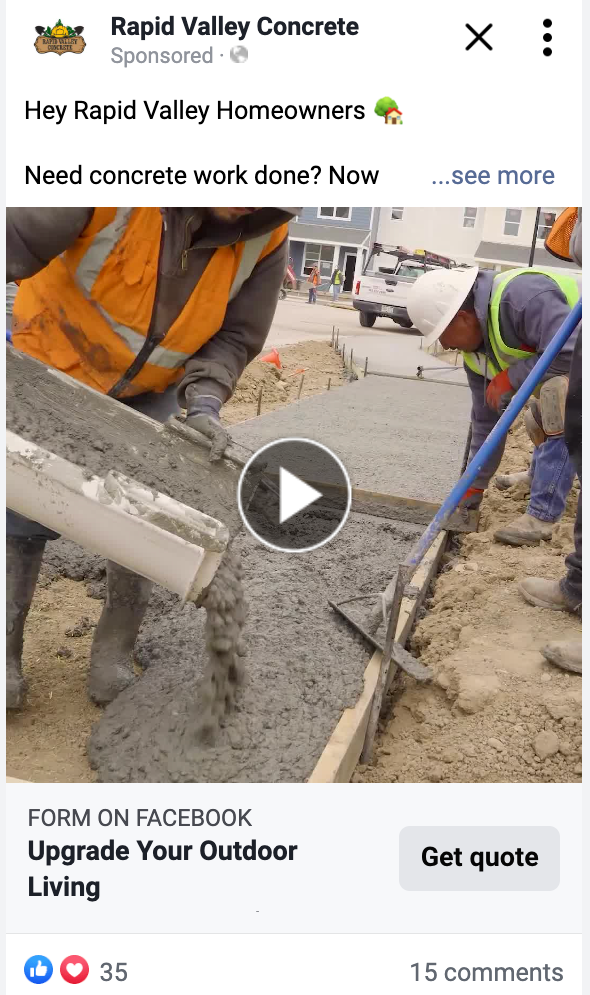
5 Key Differences Between Facebook Ads and Google Ads
Now that we've covered the basics, let's discuss the primary differences between Facebook Ads and Google Ads.
1: Audience Size
Google and Facebook both have lots of users—Google has over 5.8 billion searches daily, and Facebook has about 1.73 billion active users each day. Most of Facebook's ad money comes from mobile ads, so don't ignore mobile advertising.
Your contracting business's customers are probably on both platforms, so size alone isn't the deciding factor. Ask yourself:
- Are your customers active on these sites?
- Is your business more about search or social?
Even if Google gets billions of searches, it doesn't matter if nobody's searching for your service.
If your business is new or unknown, Facebook ads might be better for spreading the word.
2: Cost & ROI
Cost is important to think about. On Google Ads, the usual cost per click for Home Improvement/Goods industry (CPC) is $2.94, but it varies.
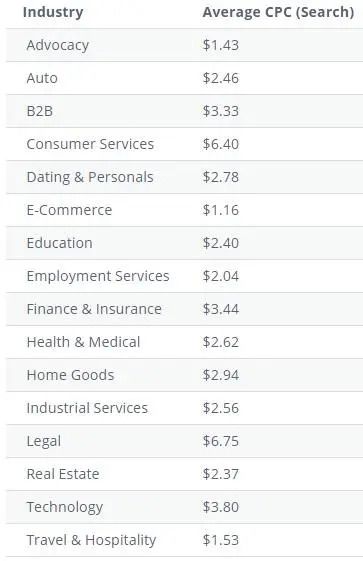
Average Google Ads CPC by industry: Source
On Facebook Ads, clicks are usually cheaper than on Google Ads. For a contracting business, a click might cost about $2.93.
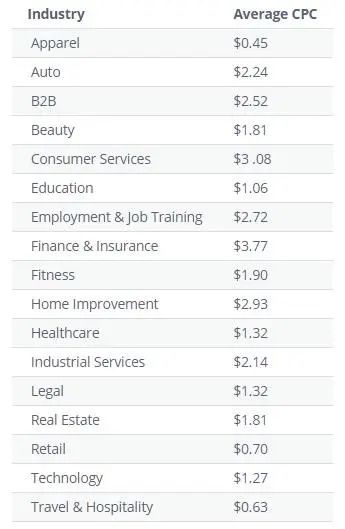
Average Facebook Ads CPC by industry:
Source
The cost per click can differ based on where the ad appears. Instagram ads, for instance, are about twice as expensive as Facebook ads.
So, which is better in terms of spending? Google Ads might have higher CPC, but the clicks could be from people closer to making a purchase. Facebook ads are good for raising awareness, while Google Ads are better for reaching people ready to buy.
In short, Google Ads usually cost more, but they might give better results in terms of actual purchases.
3: Buyer Intent
When it comes to buyer intent, Google Ads almost always outperform Facebook Ads. Consider the nature of your contracting business—do people typically search for your services when they are ready to make a purchase?
For example, if someone's roof starts leaking, they immediately start searching for a roofing contractor. Search ads would place your contracting business in front of potential customers at the exact time that they need your service.
On the other hand, that person isn't going to recall the contracting business they saw on Facebook three months ago. In this scenario, Google Ads would be the clear winner.
Facebook Ads are also generally less effective at getting leads to convert quickly. People usually go to Facebook to relax and socialize, not to shop. However, this platform is still incredibly useful for building your contracting business's audience. By creating a sense of community on social media, people will be much more likely to hire your services when they need them.
That said, if the objective of your campaign is to build brand awareness, rather than immediate conversions, then Facebook may be the best choice for your contracting business.
4: Targeting Options
Both Google and Facebook Ads let you target specific groups of people, like by age, gender, location, and income. But Facebook has more options for targeting.
Besides those basics, Facebook lets you target based on interests and behaviors. With info from their billions of users, you can get really specific. For example, you can aim ads at homeowners who like home improvement or care about the environment and make $75k-99k a year.
You can even find people similar to your current customers using Facebook's "lookalike audiences" tool. This helps you reach more potential customers who are like the ones you already have.
5: Ad Formats
What about the way ads look? It depends on what you want to achieve.
Facebook lets you get more creative, which is good for spreading brand awareness and keeping customers loyal.
With Google Ads, you're mostly working with text on search result pages. You can add extra text with ad extensions, but it's still mainly text.
On Facebook, you can use images to make your ads stand out. They have different ad formats like videos and carousels too. If your business sells things online, Facebook's visual side is something to think about when picking a platform.
Which Platform Should You Choose?
So, which is better for your contracting business - Google Ads or Facebook Ads?
First, consider your campaign's specific goals. If you're focused on generating immediate sales, Google Ads may be the better choice.
If you're aiming to expand brand recognition or reach a broader audience, however, Facebook Ads may be the better choice.
Finally, consider your advertising budget. Do you have the resources to invest in Google Ads, even in a competitive industry?
Does your company have the capability to create (or outsource) compelling image or video-based ads for Facebook? Discussing questions like these can help you formulate a strategy that's practical and effective.
When to Use Google Ads and Facebook Ads Together?
Integrating Google Ads and Facebook Ads enhances awareness, engagement, and conversions. For instance, complement Facebook Ads with Google Search Ads by targeting users interested in your offerings. Aligning messaging across platforms reinforces brand messaging and reliability.
What Is the Benefit of Using Both?
Using the powerful combination of both Facebook Ads and Google Ads is a great strategy. Facebook Ads build brand awareness and Google Ads retarget for conversion–and vice versa.
Imagine this: someone sees an ad for your roofing business on Facebook but doesn't act right away. With Google Ads, you can remind them about your services as they surf the web. Or, if someone looks for roofing help on Google but doesn't hire, you can use Facebook Ads to remind them. This shows how these platforms can work together for your business.
In short:
- Google Ads are great for quick business growth.
- Facebook Ads help get your name out there slowly.
- Ideally, use both for a complete marketing plan.
Overall, it depends on what you need, what you're aiming for, and your budget. Knowing each platform's pros and cons helps you make a plan that boosts your business.
Ready to supercharge your contracting business's marketing strategy? Book a Discovery Call with Contractor CEO now to discuss how we can help you leverage the power of Facebook Ads and Google Ads for maximum impact!
Take a look at a few of our case studies showcasing how we supported contracting companies in getting new customers with our successful lead generation strategies.
And if you're looking for FREE resources to improve your contracting business, come join our community here.
